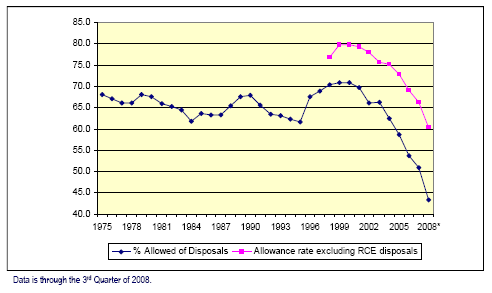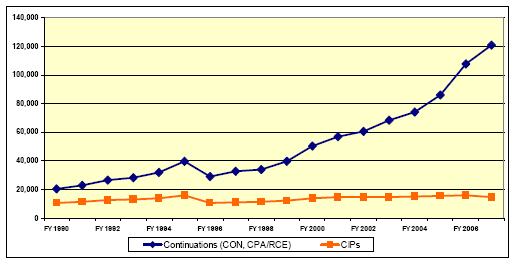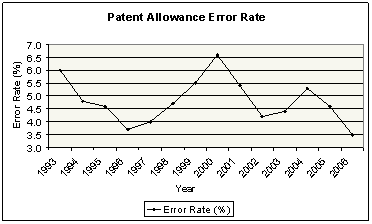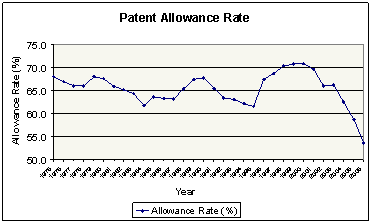Table of Contents
PTO Announcements, News, Policy, Etc.
New Appeals Rules delayed (12/10/08)
The PTO announced that implementation of the new appeals rules, set for 12/10/08, is delayed indefinitely. Hal Wegner credits David Boundy for having “quarterbacked a group effort at the OMB that ended in the blockage of this very, very unfortunate rulemaking. In a separate email, Hal Wegner states that “Dudas confidently implies that the rules will be approved an that he will implement them.
PCT Search fees increase (11/12/08)
The PTO published a change to Rule 445 so that any PCT application submitted on or after January 12, 2009 will be subjected to increased search fees. The fee changes are outlined in the table below.
| Fee | FY 2007 Payments | Former fee | Revised fee | Adj. |
|---|---|---|---|---|
| Transmittal fee | 54,335 | 300.00 | 240.00 | (60.00 ) |
| Search Fee | 30,965 | 1800.00 | 2080.00 | 280.00 |
| Suppl. Search Fee | 941 | 1800.00 | 2080.00 | 280.00 |
PTO Statistics (09/15/08)
Late September, James Toupin, in a presentation before the Intellectual Property Owners Association presented a series of slides illustrating sharp increases in continuation filings and sharp declines in allowance rates since 2000.
The slides further suggest that Rule 37 C.F.R. § 11.18(b)(2) requires that (1) applicants review prior art submitted, (2) applicants cannot file continuations to keep an application pending. Section 410 of the MPEP stating that “An applicant has no duty to conduct a prior art search as a prerequisite to filing an application for patent” no longer applies since it was “written when applications were not published and patents were not online.”
Appeals Rules Comments (09/13/08)
The USPTO comments on the proposed appeals rules published last June.
Summary of Comments
| Submitter | Summary of Position |
|---|---|
| Archiriloaie for Ceres Inc | Against. Estimates of time requirement are too low. |
| Intellectual Ventures | Against. The rules violate the Paperwork Reduction Act and the PTO improperly certified to OMB. |
| Graybeal Jackson Haley LLP | Against. “The proposed Rules . . . do not promote the issuance of valid patents.” |
| Suiter Swantz PC LLO | Against. ”. . . the Agency does not explain how the new rules will reduce delay.” |
| Dean Hinnen | Against. “The USPTO has drastically underestimated the amount of time it will take patent counsel to file an appellate brief under the new rules.” |
| Ron D. Katznelson, PhD. | Against. “My analysis showed that just the incremental paperwork burdens of the 'Appeals Rules' would be economically significant. . . .” 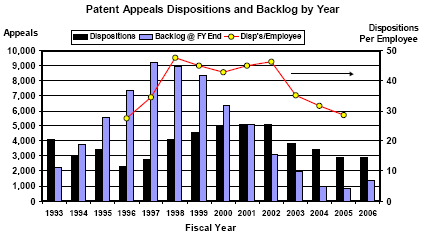 |
| Steven J. Moore | Against. “The USPTO's estimate of time spent on a reply brief is wholly pulled out of thin air.” |
| Brian A. Schar | Against. “These rules . . . go beyond procedural changes . . . and should not be implemented.” |
USPTO publishes new appeal rules, again (June 10, 2008)
The USPTO published new rules for appeal practice before the BPAI today. Although no announcement of the new rules was made on PTO's home web site, there have been lots of noise on the 'net.
PTO begins enforcement of Rule 63(b)(3) for Declarations (01/25/07)
For Oaths and Declarations filed prior to June 1, 2008, the PTO will not accept declarations that fail to meet Rule 63(b)(3), which requires that Oaths or Declarations “State that the person making the oath or declaration acknowledges the duty to disclose to the Office all information known to the person to be material to patentability as defined in § 1.56. Previously, and in accordance with a reply to Comment 38 in the 1992 Final Rule, use of the phrases “material to examination” or “in accordance with 37 CFR 1.56(a)” was deemed acceptable. No more. The PTO further advises that despite the waiver as to what should be included in the Oath/Declaration, the “material to patentability” standard of Rule 56 dictates what should be submitted to the PTO.
District Court ruling favors GlaxoSmithKline against USPTO -- Rules Blocked (10/31/07)
- News blurb
GlaxoSmithKline sues Dudas for injunction against new rules (10/19/07)
The web is abuzz with excitement over the latest attack on the continuations and claims rules to go into effect on Nov. 1. Meanwhile, the PTO has jumped the gun, ordering Examiners to not examine applications with more than 5 independent or 25 total claims (5/25) prior to Nov. 1.
- On the GSK suit:
- Amicus Briefs for AIPLA, IBM, and SanDisk Summary, links, and discussion
- Letter from NY Senator Chuck Schumer
- On the PTO prematurely imposing 5/25 restrictions:
PTO publishes clarification on new continuation rules (10/11/07)
The USPTO published Clarification of the Transitional Provisions Relating to Continuing Applications and Applications Containing Patentably Indistinct Claims. Highlights include:
- Petition and showing is not necessary if a continuing application satisfies the “one more” provision 1) or the continuations limits set forth in Rule 78(d)(1)(ii), (iii), and (vi). Previously, the “one more” rule appeared to limit the number of continuations to one more continuation regardless of the number of other continuations previously filed.
- Requirement of Rule 78(d)(3) that applicants must identify claims in CIP applications for which the subject matter is disclosed in the prior-filed application is waived or delayed with respect to CIP applications pending as of Nov. 1, 2007. If the application receives an action on the merits prior to Nov. 1, 2007, then the requirement is waived, although the office may still request this information pursuant to Rule 105. For applications pending as of Nov. 1, 2007 but for which no Office Action has been issued, the Applicant has until February 1, 2008 to comply.
- For applications having an actual filing date before Nov. 1, 2007, the requirement set forth in Rule 78(f)(1)(i)(A) is waived, so that the applicant need not identify any other pending or patented application that does not have the same actual filing date of the same benefit or priority filing date as the subject application, even if the other application has an actual filing date or benefit or priority date within two months months of the subject application.
- For applications having an actual filing date after Nov. 1, 2007, the applicant need not identify any other pending or patented application that has an actual filing date or benefit or priority filing date before Nov. 1, 2007 unless:
- the subj. application has a benefit or priority filing date that is the same as the actual filing date of the benefit or priority filing date of the other application, or
- the subj. application has an actual filing date or benefit or priority filing date on or after Nov. 1, 2007 that is the same as or within two months fo the actual filing date, benefit, or priority date of the other application.
- The term, “examined” as used in Rule 78(d)(1)(ii)(B) does not include international phase examination under PCT Article 31 that occurs as a result of filing a Demand. Thus, the filing of a Demand does not preclude the application from filing a divisional application for each invention not elected for examination in the application after entry into the national stage.
PTO publishes Guidelines on Obviousness in light of KSR (10/10/07)
The USPTO published examination guidelines for determining obviousness under 35 U.S.C. 103 in view of the Supreme Court decision in KSR International Co. v. Teleflex Inc.
New Rules for PCT Applications, effective Sept. 10 (09/11/07)
Yesterday the PTO published new rules in the Federal Register that affect PCT applications. As stated in the Summary: “These amendments result in the addition of a mechanism to the PCT system whereby applicants may request that the right to claim priority be restored in applications that meet certain requirements. In addition, these amendments provide a means for applicants to insert a missing portion of an international application without the loss of the international filing date. These amendments also clarify the circumstances and procedures under which the correction of an obvious mistake may be made in an international application. Finally, the Office is revising the search fee for international applications.”
Highlights:
- § 1.17 (t) For the acceptance of an unintentionally delayed claim for priority . . . or for filing a request for the restoration of the right of priority . . . $1,370.00.
- $ 1.57(a)(2) is amended to reflect that “incorporation by reference” is effective only in the U.S., and that omitted portions of international applications, which applicant desires to be effective in other designated States, must be submitted in accordance with PCT Rule 20.
- § 1.437(b) is deleted to reflect the fact that missing drawings will no longer be treate differently from missing parts of the description or claims.
- § 1.445 (a)(2) A search fee . . . $1,800.00.
- § 1.445 (a)(3) A supplemental search fee per additional invention . . . $1,800.00.
- § 1.452 is added to provide for restoration of the right of priority in international applications. Certain changes have been made to this section from the previously proposed language in order to correct or eliminate inconsistencies between the section and the language of the PCT Regulations.
Continuation Rules Challenged (08/23/07)
Patently-O and a number of other sites announced a law suit by Dr. Tafas seeking to enjoin the PTO from enforcing the new rules relating to continuation and claim limitations and declare them null and void as being in excess of the authority delegated by Congress. The complaint bases the suit on the following legal grounds:
- The Director and the USPTO exceeded their authority under the Patent Act, 35 USC §2 by promulgating rules that are contrary to §§ 120, 132(b) and 265 of the Patent Act.
- The Director and the USPTO violated §§ 553(c) and 706(2) of the Administrative Procedures Act (5 U.S.C. § 553(c) and 706(2)) by failing to consider all relevant matter presented to them during the rule making process, purporting to enact Revised Rules with retroactive effect, and in promulgating rules that are arbitrary and capricious, an abuse of discretion, or otherwise not in accordance with law; contrary to constitutional rights and in excess of the USPTO's statutory jurisdiction and authority.
- The Rules violate Article I, Section 8, Cl. 8 of the Constitution by virtue of the USPTO . . . failing to appropriately weigh the effect of its regulation on the promotion of the progress of science useful arts, and violative of the Takings Clause in the Fifth Amendment . . by effectuating a taking of property without due process.
- Commentary
Continuation Rules Published; Effective Nov. 1 (08/21/07)
The PTO published new rules effective Nov. 1, 2007, with many provisions effective retroactively.
PTO would limit Markush claims by new rules (08/12/07)
On August 10, 2007, the PTO published proposed rules limiting the use of alternative language in claims. Comments must be received by October 9, 2007.
- Analysis
Proposed BPAI rules increase burden on appellants (07/31/07)
The PTO has published (links below) proposed rules that “seek to provide examiners and Office reviewers with a clear and complete statement of an appellant's position at the time of filing an appeal brief so as to enhance the likelihood that appealed claims will be allowed without the necessity of further proceeding with the appeal, minimize the pendency of appeals before the Office, minimize the need for lengthy patent term adjustments in cases where claims become allowable as a result of an action by the Board in an appeal, provide uniform treatment of requests for an extension of time filed after an appeal brief is filed, and make the decision-making process more efficient.” Some highlights are listed below. The PTO is accepting comments through September 28, 2007.
Proposed Rules (06/27/07)
After ignoring for some time proposed changes to the rules relating to continuations and claim limits currently being pondered by the Office of Management and Budget (OMB), PatentBlurb finally relents after identifying the following articles, which are selected for useful content as opposed to rumors and speculation. It should be noted that the rules actually being considered by the OMB are not public, so their content is unknown. However, many believe that, due to administrative rules, they cannot be very different (without offering them up for additional public comment) from the claims practice and continuation practice rules published by the Patent Office in January of 2006. If the OMB does not object to the rules, publication is expected in the next month.
USPTO issues memo on KSR v. Teleflex (05/03/07)
Deputy Commissioner Peggy Focarino of the USPTO has issued a memo instructing Examiners that it remains necessary, in view of KSR v. Teleflex, to provide an explicit rationale for combining references.
- text of memo (see “memo” link above for PDF version)
PTO reexamines reexams, updates rules (04/19/07)
On July 16, 2007, the PTO published rule changes in the Federal Register related to reexaminations. Specifically, “The Office is revising the rules to prohibit supplemental patent owner responses to an Office action in an inter partes reexamination proceeding without a showing of sufficient cause. Finally, the Office is making miscellaneous clarifying changes as to terminology and applicability of the reexamination rules. The Office is not implementing its proposal (that was set forth in the proposed rule making) to newly provide for a patent owner reply to a request for reexamination, prior to the Office’s decision on the request.”
PTO issued first patent under "Accelerated Review" program (03/16/07)
Appealed Applications Statistics from Patently-O (03/05/07)
Dennis Crouch has crunched some statistics on 10,000 published applications and found some notable facts in his results:
PTO Rule Changes for PCT (03/03/07)
On February 16, 2007, the PTO published proposed rules to add “a mechanism to the PCT system whereby applicants may request that the right to claim priority be restored in applications that meet certain requirements. In addition, these amendments will provide a means for applicants to insert a missing portion of an international application without the loss of the international filing date. These amendments also will clarify the circumstances and procedures under which the correction of an obvious mistake may be made in an international application. Finally, the Office is proposing to revise the search fee for international applications” from $1000 to $1800. Comments must be submitted by March 19, 2007.
More rumors and speculation on proposed continuation rule changes (03/02/07)
Rumors are surfacing that the proposed rule changes limiting continuation filings will either be issuing by Summer, or are “dead as a doornail”.
PTO Revises Proposed Rules on Atty/Agent Ethics (02/28/07)
The PTO published revised proposed rules relating to the practice of patent law by registered attorneys and agents. As stated in the announcement, ”'participation' in drafting applications and activities 'incident to the preparation an dprosecution of patent applications before the Patent Office' are no longer included in the definition.“ This excludes the drafting of contracts or selection of a contract form, such as assignments or licenses, “if the state in which the agent resides . . . considers drafting contracts the practice of law.” As noted in Patently-O, this affects not only agents, but lawyers practicing out of a state in which they are admitted.
- Commentary
Pendency Snapshot at PTO (02/16/07)
Patently-O has performed some statistical analysis of recently issued patents.
New PTO Fee schedule effective Feb. 1, 2007 (02/07/07)
The PTO released a new fee schedule that is effective February 1, 2007. The only change in fees that I could notice was the removal of the fee for the disclosure document submission program, which was eliminated.
New rules on Missing Parts (01/30/07)
The PTO has issued new rules relating to how non-provisional patent applications are handled. In particular, the PTO will now require that if the Applicant accepts the application as filed (with missing parts) an Amendment to correct the application must be filed within a limited time period.
USPTO issues new rules on electronic filing (01/25/07)
On January 23, the USPTO issued new rules, effective January 23, 2007, which apply to any paper, application, or proceeding filed in the Office on or after January 23, 2007. The new rules primarily relate to timeliness issues of electronic submissions. The new rules provide that local time of the filer (not the time at the PTO) can determines the day of submission if accompanied by a certificate of electronic transmission. No comment period on the new rules was provided as the PTO deemed the comment period unnecessary because the rules are “merely interpretive” and “not substantive” under the Administration Procedure Act, and therefore not required under 5 U.S.C. 553(b)(A), and a 30-day advance publication was not required under 5 U.S.C. 553(d).
PTO Issues Final Rule on Paperless Certified Copies (01/17/07)
The PTO issued a final rule on a Priority Document exchange program that will allow the U.S. Patent Office to electronically exchange priority documents with other patent offices such as the EPO and the JPO. No prior notice or comment period was deemed necessary under 5 U.S.C. § 553(b)(A). Under the new rule, if a priority document is provided to a foreign intellectual property office pursuant to a priority document exchange agreement, then there is no fee to the Applicant for providing the document.
PTO has initiated Pilot Program for electronic document delivery (01/17/07)
On December 19, 2006, the PTO announced that a pilot program for receiving notices from the technology centers by email went into effect on December 16, 2006. According to the announcement, a limited number of private PAIR users can opt-in to receive email notifications of outgoing correspondence on the Customer Number Details screen for a customer number associated with a correspondence address. If successful, the program will go into full production in June at which point the program will be open to all users having a Customer Number and access to Private PAIR.
PTO Touts Low Allowance Error rate... (12/27/06)
The PTO has announced that patent and trademark quality is the best in 20 years:
. . . In other news, the allowance rate is the lowest in 30 years:
PTO upgrades PAIR (12/12/06)
Private PAIR 7.0 to be released… Features include:
- Customer Number Details Online Self-Administration
- Attorney Docket Number Online Self-Administration
- Pending Non-Published PCT Application Search
- Ordering of Certified Copies for Private Applications via Private PAIR
- XML Application Data Download
- Display References Tab will have two more sections of references
Disclosure document program being eliminated (11/08/06)
Interim Guidelines comments posted (10/24/06)
The USPTO has posted comments in response to the Request for Comments on Interim Guidelines for Examination of Patent Applications for Patent Subject Matter Eligibility published in the Federal Register at 71 Fed. Reg. 34307 (June 14, 2006), which Guidelines were published in the Official Gazette at Off. Gaz. Pat. Office 142 (November 22, 2005).
Dudas: Aliens need not apply for patent registration
In Lacavera v. Dudas, the CAFC affirmed a district court ruling finding that the PTO may regulate recognition of patent attorneys and limit same to U.S.citizens, permanent residents, and foreigners living abroad, and exclude temporary resident aliens like Lacevera. Lacevera has now filed a petition for writ of cert. Unfortunately, the Supreme Court may not get a chance to rule on the matter. According to Patently-O, Lacevera was granted permanent resident status shortly after filing her petition. Lacevera is a Canadian patent attorney with Google. Read more.
PTO fee-diversion case fizzles in Fed Cir (10/16/06)
In Miguel Figueroa v. U.S., the CAFC finds that Congress has not exceeded its authority under the Patent Clause in charging excess fees. Using a rational-basis test, Congress can “rationally decide to set fees above what is needed to meet the funding needs of the PTO in order to deter the filing and prosecution of certain types of patent applications. The Supreme Court has recognized that Congress may legitimately impose taxes or fees in order to discourage undesirable behavior.”
Clarifications on Reexaminations (10/10/06)
In a Notice of Clarification of Office Policy To Exercise Discretion in Reexamining Fewer Than All the Patent Claims, (signed 05Oct2006) The PTO Announces that:
- The request for reexamination: If reexamination is requested for fewer than all of the patent claims, the Office's determination on the request (the order granting or denying reexamination) will generally be based on a review on the merits of only the claim(s) for which reexamination was requested.
- The examination stage of a reexamination proceeding: In the examination stage of the proceeding, the Office will generally only examine claims for which a) reexamination was requested, and b) a substantial new question of patentability (SNQ) was raised.
- The Office has recently incorporated the substance of this Notice, in MPEP Chapter 2200 for ex parte reexamination, and MPEP Chapter 2600 for inter partes reexamination in the August 2006 Revision 5 of the eighth edition of the MPEP.
MPEP Revised: Eighth Edition, Revision 5 (09/18/06)
Revisions to MPEP 8th Ed., r5 implement the following final rules:
- "Changes To Implement the Cooperative Research and Technology Enhancement Act of 2004," which became effective on September 14, 2005;
- "Provisions for Claiming the Benefit of a Provisional Application With a Non-English Specification and Other Miscellaneous Matters," which became effective on November 25, 2005;
- "Changes To Implement the Patent Search Fee Refund Provisions of the Consolidated Appropriations Act, 2005," which became effective on March 10, 2006; and
New Rules in Effect for Reexams (8/29/06)
SUMMARY: The United States Patent and Trademark Office (Office) is, in this final rule making, revising the rules of practice relating to the filing date requirements for ex parte and inter partes reexamination proceedings for consistency with the provisions of the patent statute governing ex parte and inter partes reexamination proceedings, and to permit the Office to have the full statutory three months to address a request for reexamination that is complete. The Office is specifically revising the rules to require that a request for ex parte reexamination or for inter partes reexamination must meet all the applicable statutory and regulatory requirements before a filing date is accorded to the request for ex parte reexamination or for inter partes reexamination.
PTO requests comments on 5-year plan (08/28/06)
The PTO released for public commnent a draft five-year strategic plan designed to foster American innovation and competitivenessquality and timeliness in the patent review process. Read the Announcement.
USPTO and DKPTO Classification Collaberation
The USPTO and the Danish Patent and Trademark Office Announced Cooperative Effort on Reclassification of Patent Search Documents (23Aug2006)
Listen to Figueroa v. U.S. oral arguments (08/08/06)
Listen to oral arguments before the Circuit Court of Appeals in Figueroa v. U.S., where an inventor is suing the U.S. government claiming that diversion of patent fees is unconstitutional. These oral arguments were heard on April 4, 2006. Brian Mizoguchi is the government's attorney and Heath Hoglund and Robert Rines are plaintiff's attorneys. The recording is about 40 minutes long.
New IDS Requirements Proposed (07/10/06)
The PTO today published new proposed rules for submitting IDSs.:'''
SUMMARY: The United States Patent and Trademark Office (Office) is proposing changes to information disclosure statement (IDS) requirements and other related matters to improve the quality and efficiency of the examination process. The proposed changes will enable the examiner to focus on the relevant portions of submitted information at the very beginning of the examination process, give higher quality first actions, and minimize wasted steps. The Office is proposing the following changes relating to submissions of IDSs by applicants/ patent owners: Before a first Office action on the merits, require additional disclosure for English language documents over twenty-five pages, for any foreign language documents, or if more than twenty documents are submitted, but documents submitted in reply to a requirement for information or resulting from a foreign search or examination report would not count towards the twenty document limit; permit the filing of an IDS after a first Office action on the merits only if certain additional disclosure requirements have been met; and eliminate the fees for submitting an IDS. Updates to the additional disclosure requirements would be required as needed for every substantive amendment. The Office is also proposing to revise the protest rule to better set forth options that applicants have for dealing with unsolicited information received from third parties.
PTO Extends comment period on Interim Guidelines (June 15, 2006)
Request for Comments on [local:InterimGuidelines.pdf Interim Guidelines] for Examination of Patent Applications for Patent Subject Matter Eligibility, Request for comments extension of comment period (14June2006)
- PTO waiting for decision from U.S. Supreme Court in Laboratory Corp. of America Holdings v. Metabolite Laboratories, Inc., S.Ct. No. 04-607, to allow comments to take this decision into account. The decision is expected by the end of June.
- Update: Supreme Ct. dismisses writ for cert. in Lab Corp (see above).
- Update: See Ex parte Bilski.
